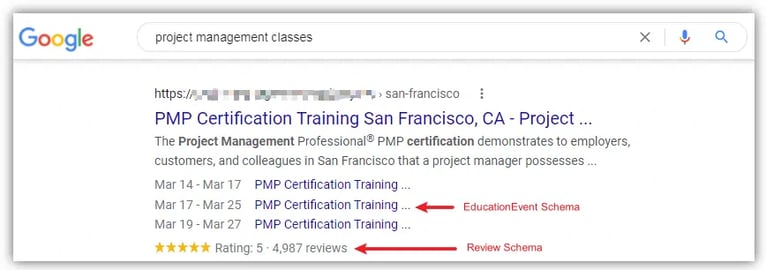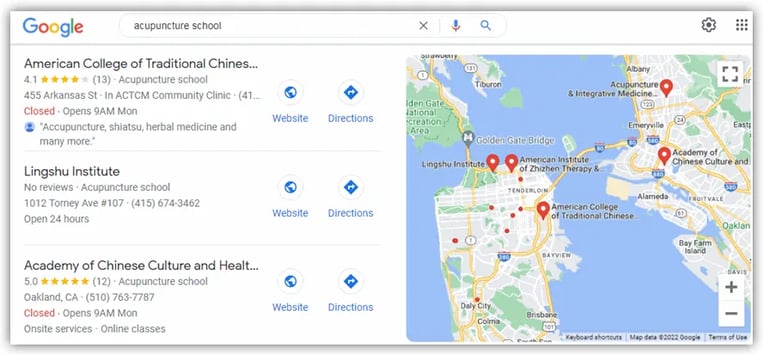Here are 6 advanced SEO tactics, tailored to training providers:
Although the concepts in this article apply equally to Bing and DuckDuck Go, we’ll use Google’s algorithm as the primary example of a search engine, and refer to it simply as “Google.” Likewise, while SEO is only one of many digital marketing channels, it can have an outsized impact on topline revenue if Google favors your site.
1. Link-Building
You’ve probably heard how important it is to have inbound links from other authoritative sites in your industry. But how do you get them? The standard answer is: “Create content that is so great, people will want to link to it.” – but that’s too time-consuming! Here are some easier techniques:
- Directories. For each industry, there are always a number of directory websites where companies — not only members of that industry, but also providers serving that industry — can add their URL. For example, if you provide continuing education classes for chiropractors, you can find industry directories on Google with a search like: chiropractor "add URL" – or variations with "submit site" or "get listed." If the training you provide is regulated, such as for trade schools or degree-granting institutions, make sure that any government websites listing approved organizations include your website — since inbound links from .gov websites (examples: 1, 2, 3) convey extra "SEO juice."
- Employees. Your trainers or teachers are also in your industry, and they may have blogs, social media platforms, or resume websites. They should be receptive to your request to link back to them.
- Students. After completing training, students are usually proud of their accomplishment and thankful for your role in improving their career prospects – resulting in goodwill towards your company. Like your trainers, your student graduates may have web properties where they'd be willing to link back to you.
- Suppliers. Do you have favorite vendors? Examples include courseware publishers, exam prep services, or manufacturers of equipment you use in your classes. You could write a nice testimonial for their services, and ask to be a featured customer on their site, with a link back to your site. You might even suggest an idea for a joint press release where the link back to your site could get syndicated to industry journals.
- Competitors. Using an SEO tool like SEM Rush, you can easily find out who links to your competitors. It's possible those parties might consider linking to you as well. This technique is often called "Link Intersect" — it shows you which websites link to 2 or more of your competitors, but don't yet link to you.
After you’ve exhausted the easy techniques, here are some other link-building strategies:
- Guest blogging
- Creating and hosting compelling infographics, resource collections, or ultimate-guide-style articles
- Broken link building
- Converting mentions of your company into links
2. Schema
"Schema" is code that you add to your web pages to help search engines better understand them. It looks like this:
<script type="application/ld+json">
"@context": "https://schema.org",
"name": "Deal Me In School",
"@type": ["EducationalOrganization","LocalBusiness"],
"@id": "https://pokerdealerschoool.com/#EducationalOrganization",
"naics":"611110",
"geo": {
"@type": "GeoCoordinates",
"latitude": "37.794836",
"longitude": "-122.4057157"
},
"address": {
"@type": "PostalAddress",
"streetAddress": "123 Main St.",
"addressLocality": "Springfield",
"addressRegion": "OR",
"postalCode": "97477"
}
</script>
This code specifies the attributes of your company, so Google doesn’t need to try to decipher that from the scramble of words and images on your website. Each industry has a different set of schema conventions; for the training industry, you can find them by looking at the source code of your competitors’ websites, or by looking through the official website schema.org. For training providers, the relevant types of schema are:
- EducationalOrganization
- LocalBusiness – unless it's online only
- Course
- EducationEvent
- Review
Setting the correct schema can greatly improve your SEO. For example, after adding the EducationEvent schema for the different sessions of your classes, Google may give them some extra real estate in the search engine results pages:

3. Local SEO
Ranking in the maps section of Google results is critical for training companies with a local presence. While some types of classes have permanently shifted to online delivery, other types of training can only be done locally and in-person. These include vocational education involving equipment, manual procedures, or ongoing mentorship: examples include training in automotive repair, nursing, plumbing, cosmetology, truck driving and similar.
Google presents local map results when the search phrase:
- Includes the words "near me," or the name of a town, city, neighborhood, or zip code
- Only appears in a local context. For example, the search phrase "acupuncture school" only has meaning in a local context, whereas "sexual harassment training" is most often delivered online.

If your training business operates locally, the biggest factor in whether your site appears in the "map pack" is proximity: how close your business is to the location of the searcher. Beyond that (no pun intended), you can still influence the results using Google Business Profile and Schema.
Google Business Profile ("GBP") is similar to Yelp: a service where you can claim and configure your business details:
- Specify basic info: address, phone, products, services, industry category and more
- Collect and respond to customer reviews
- Post updates and photos
Apart from the usual ranking factors for the destination website and its geographic proximity to the searcher, these GBP features increase the likelihood that your site will rank in the pack of 3 local sites:
- Business category: the correct business category for your organization is likely the one that either: most closely matches the searcher intent, or that was also chosen by the majority of your competitors
- Reviews: quantity of reviews, their average score, and the appearance of the search phrase in a review
- Listing Completeness: Google favors GBP entities that have completed all the relevant sections of their profile, so make sure to fill out everything you can.
Schema also plays an important role in local SEO, since you can use the LocalBusiness schema type to designate your branch addresses, phone number, or even longitude and latitude coordinates.
4. Social Signals
Increasing your organization's social reach is important in itself, but Google's ranking algorithm also uses shares and other "social signals" as a ranking factor.
More so than for other types of purchases, students take pride in their continuing education, and are inclined to share messages on social media, to:
- Invite friends and colleagues to attend with them
- Show appreciation for their employer, who may have paid for the course
- Highlight their advancement in their careers

Training providers should take advantage of this receptiveness on the part of their students to share the details of their continuing education. You can offer on your checkout pages, a "share this" button, for enrolling students to invite others to join and attend with them. For students completing their courses, you can email them a link to a page where they can download a PDF of their certificate of completion, with a button to automatically share their achievement on LinkedIn.
5. Search Phrase Nuances
Is the Google search phrase "PowerPoint training" the same as "PowerPoint classes?" It turns out Google presents very different results for what would otherwise appear to be synonymous search phrases.
The word "training" has several close synonyms: "class," "course," and "workshop." Each word represents a slightly different underlying search intent, and each has slightly different connotations:
- In-Person vs. Online Training. The presence of the words "training" and "classes" in the search phrase correlate with higher rankings for in-person training, whereas the word "course" correlates more with self-paced training.
- Commercial Intent. Certain words indicate that the searcher is ready to buy, versus searching for a more do-it-yourself approach to learning:
- Words indicating a willingness to pay for training: "CPE," "PDU," "eligible," "accredited," "certificate," etc.
- Words indicating a desire to avoid paying for training: "youtube," "webinar," "video," "tutorial," "PDF," and of course "free"
- Position in sales funnel: some search phrases indicate that the user is at the bottom of the funnel and ready to buy, and others correlate with users in the discovery and research phases. The longer and more specific the search phrase, the lower the searcher is in the sales funnel. For example, the search phrase "short online CPA courses eligible for CPEs" indicates a high readiness to purchase, coming from an accountant who has refined his search to match sites mentioning his mandated continuing professional education units. On the other hand, vague search phrases like "courses for CPAs" typically come from buyers that are still in the initial stage of researching their training.
- Training Duration. Words within the search phrase often hint at the expected duration of the training. For example, "workshops" are short, but "courses" are long.
- B2B or B2C. Buyers paying for training out of their own pocket more often use the word "class" or "course." Students using their employer's training budget are more likely to use the word "training" in their searches.
Synonyms for "training"
| Primary word | Representative Examples | In-Person vs. Online | Expected Duration | B2B or B2C |
|---|---|---|---|---|
| "training" | "Quickbooks training," "CDL training," "CNA training," "OSHA training" | Could be either | Multiple days or ongoing | More likely B2B |
| "course" | "Excel course," "PMP course," "real estate course," "python course" | More likely online, with the exception of college courses | Multiple days if in-person; a few hours if self-paced online | either |
| "class" | "pottery class," "yoga class," "cooking class," "Photoshop class" | More likely in-person | 1 - 5 days | More likely B2C |
| "workshop" | "writers workshop," "sewing workshop," "French workshop" | More likely in-person | 2 hours | More likely B2C |
| "lessons" | "swimming lessons," "piano lessons," "golf lessons" | More likely in-person | 1 - 2 hours | B2C |
Below are the number of monthly searches for different combinations of topics and the various synonyms for "training," according to the SEO tool Ahrefs, with the largest volume highlighted in red. Note that SEO consultants refer to the search phrase as the "keyword" – even if the phrase contains multiple words.
Monthly Search Volume for Training-Related Keywords
| Topic | "training" e.g., "osha training" |
"course" / "courses" e.g., "osha course" | "class" / "classes" e.g., "osha class" | "workshop" / "workshops" e.g., "osha workshop" | "lessons" e.g., "osha lessons" |
|---|---|---|---|---|---|
| CDL (commercial drivers license) |
43k | 600 / 250 | 2.3k / 9.8k | <5 | 80 |
| CNA (certified nursing assistant) | 16k | 2.7k / 1.7k | 2.1k / 26k | 0-10 / <5 | 30 |
| AWS (Amazon Web Services) |
9.1k | 500 / 1.0k | 100 / 300 | 70 / 700 | 5 |
| OSHA | 8.5k | 300 / 450 | 350 / 1.1k | 10 / 10 | 5 |
| forklift | 8.5k | 300 / 1.1k | 80 / 20 | 5 / <5 | 30 |
| Quickbooks | 6.3k | 700 / 400 | 500 / 1.6k | 30 / 30 | 300 |
| leadership | 5.7k | 350 / 1.1k | 350 / 700 | 300 / 250 | 900 |
| cybersecurity | 5.3k | 150 / 800 | 90 / 1.1k | 10 / 5 | 20 |
| excel | 4.9k | 4.8k / 3.8k | 2.5k / 2.4k | 200 / 90 | 400 |
| sexual harassment | 2.5k | 150 / 20 | 50 / 20 | 5 / 5 | <5 |
| sales | 2.5k | 150 / 500 | 60 / 300 | 50 / 30 | <5 |
| customer service | 2.2k | 150 / 150 | 60 / 200 | 60 / 20 | <5 |
| time management | 600 | 250 / 350 | 150 / 150 | 100 / 60 | 70 |
6. Content Marketing
When people hear about content marketing for the first time, they often ask: "How can writing articles for my website generate revenue?" It’s true: it's not obvious. Let's start with the premise that it may already be too difficult for your website to rank for the top keywords "[my topic] training" or "[my topic] courses" — searchers usually only click on the top 3 results, and some of your competitors probably started investing in SEO a long time ago — so it might be too late for your company. If it's too difficult to rank for the primary keywords in your niche, you need to find a more circuitous route to luring potential students to your site. That's where content marketing comes in.
There are 3 different strategic goals when writing content to attract individual students and corporate buyers:
- Get Them In Your Funnel. If your newsletter is good enough, you can get visitors to subscribe, so they agree to get notified of your new articles. At that point you have a mechanism to regularly remind them of your services, so that when they're ready to buy, your company will be top of mind.
- Establish Authority and Goodwill. Even if a visitor doesn't subscribe to your newsletter, the quality of your content should establish your company's authority in your industry. Your content should target your buyers' questions and pain points, and by helping them, you'll instill trust and establish goodwill with them. When they are ready to buy, this marketing "touch point" will increase the likelihood that they'll register for your classes over your competitors. Google has emphasized that Expertise, Authority, and Trust ("E-A-T") are among its primary ranking factors.
- Garner Inbound Links. If your content is truly helpful to readers, it may eventually gather some inbound links. With its emphasis on trustworthiness and authority, Google has given webmasters an incentive to incorporate links to authoritative websites — this is why so many articles nowadays contain links to The New York Times, Wikipedia, or scholarly journals. If your article becomes the authoritative source on a topic, other content marketers will be incentivized to link to it. These inbound links to your blog articles benefit your site in 2 ways:
- They increase your overall Domain Authority, which improves the search rankings of all your pages
- You can intentionally pass the valuable inbound “link equity” from your article to targeted product pages on your site via internal links. For example, if you write a popular article on passing a particular certification exam, you should link from that article to the course description page for that topic.
To get you started, here are some training-related ideas for content marketing:
| Content Type | Searcher | SEO Target Keyword | Content Title |
|---|---|---|---|
| article | Corporate buyers | "leadership training ROI" | "How to Measure ROI for Leadership Training" |
| article | Student | "MB-100 exam questions" | "Hardest Questions on the MB-100 Exam" |
| infographic | Student | "MS sysadmin certifications diagram" | "Certification Paths for Microsoft Systems Administrators" |
| spreadsheet | Corporate buyers | "training budget excel template" | "Departmental Training Budget Spreadsheet" |
| Student | "Sample training request letter PDF" | "How to Convince your Boss to Pay for Training" |
If you’d like to find out more about digital marketing, you can get in touch with the author of this article for a free 30-minute consultation on either paid online advertising or SEO for training companies.





-2.png)
